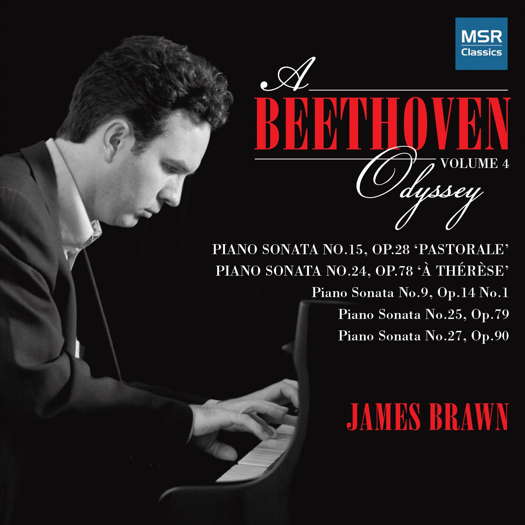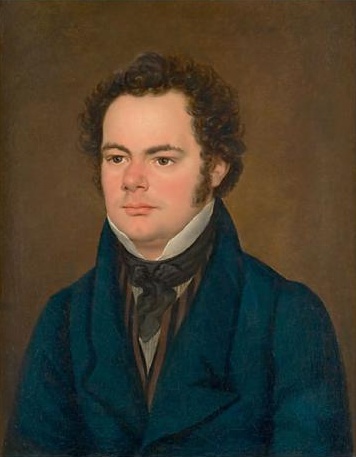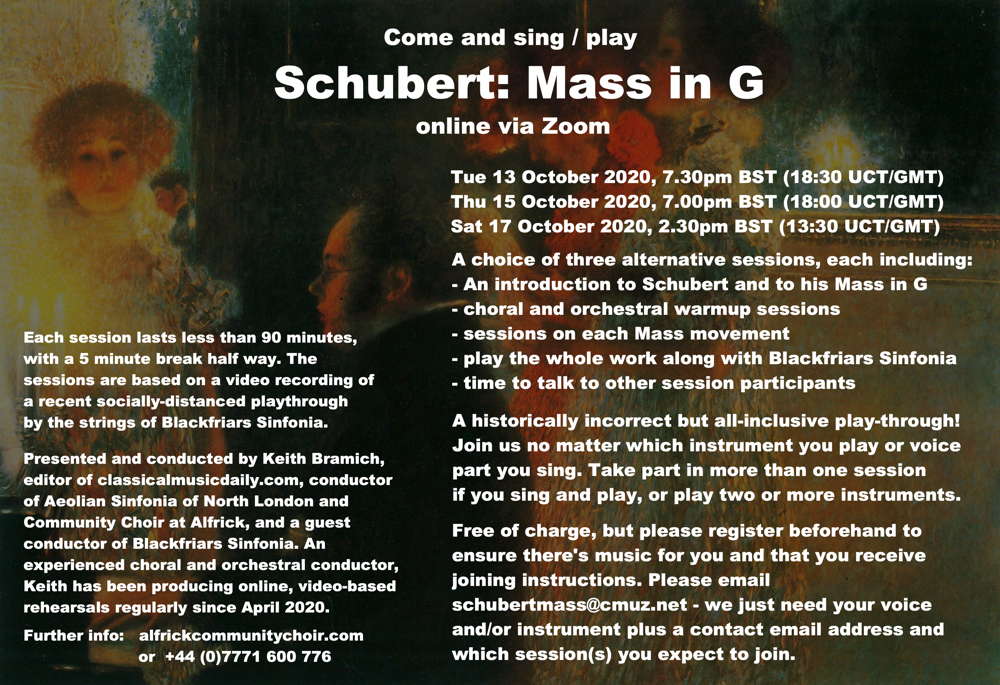- Ian Bostridge
- Vasilije Mokranjac
- Domarto
- Kamilló Lendvay
- Gál
- Götz Friedrich
- The Performing Artist as Co-creator
- Michael John Haden: Hymn to Love
 SPONSORED: CD Spotlight. Pure Magic - James Brawn's continued Beethoven Odyssey, awaited by Andrew Schartmann.
SPONSORED: CD Spotlight. Pure Magic - James Brawn's continued Beethoven Odyssey, awaited by Andrew Schartmann.
All sponsored features >>
 DISCUSSION: John Dante Prevedini leads a discussion about Composers, individuals or collective?, including contributions from David Arditti, Halida Dinova, Robert McCarney and Jane Stanley.
DISCUSSION: John Dante Prevedini leads a discussion about Composers, individuals or collective?, including contributions from David Arditti, Halida Dinova, Robert McCarney and Jane Stanley.
Schubert via Zoom
Sing and/or play Schubert's Mass in G online
Known largely for his Lieder, the Unfinished Symphony and his tragically short life, Viennese composer Franz Peter Schubert (1797-1828) left an amazing legacy of music for such a short life. Schubert doesn't normally come to mind for his choral music, but in fact he wrote two Requiems, a Stabat Mater and six complete settings of the Mass. The second of these, the Mass in G major, D 167, one of two dating from 1815, is the best known of Schubert's three shorter settings, and is hence a Missa Brevis, with performances typically taking between twenty and twenty-five minutes. Its six movements consist of a Kyrie, Gloria, Credo, a Sanctus and Benedictus (which both lead to an Osanna in excelsis section) and an Agnus Dei.

Oil painting of Franz Schubert (1797-1828) in circa 1827, possibly by Austria-based Bohemian painter Anton Felix Depauly (1801-1866)
In our precious and very recent COVID-19-free world, performances of this work were quite common. This was one of the first choral works which the writer of this note sang as an adult.
In February and March 2020, Keith Bramich, editor of Classical Music Daily, was teaching this work to his community choir in Worcestershire, UK. Frustratingly, rehearsals had to stop just a week or two away from their planned performance.
Like so many other people, suddenly stuck at home in a new isolated existence, Keith began organising virtual meetings over Zoom for his amateur choir and orchestra, just in order to talk and keep the groups together. A choir member suggested that the sessions could involve some rehearsing, and over the following months, Keith taught himself video editing, and he, with Emily Davis, Lucas Ball and other friends in the Community Choir at Alfrick in Worcestershire, UK, developed a method of holding choir practices online which, to some extent, avoided the obvious pitfalls of music-making over the internet.
During their online sessions between April and August 2020, the choir continued to return to and explore Schubert's Mass in G, but now it's time to give it one last outing, at least for the time being, and move on. The choir normally works with a pianist, Classical Music Daily contributor Lucas Ball, but, during a session in September 2020, Keith Bramich made a video recording of a playthrough of this Schubert Mass by the strings of Blackfriars Sinfonia, an amateur repertoire orchestra rehearsing each week in central London, and this recording will be used as the basis for a series of three online sing and play sessions.

Come and sing/play Schubert: Mass in G
The sessions, each of which is planned to run for just under ninety minutes, will feature a video introduction to Schubert and his Mass in G, choral and orchestral warm-up sessions, a session on each of the six movements of the Mass in G, a play-through of the whole work, and time to talk to everyone else in the session. If you sing and play, or if you play more than one instrument, the sessions are designed so that you can take part more than once, each time from a different perspective, if you wish.
Described as 'historically incorrect but all-inclusive play-throughs', these sessions are set up so that you can join regardless of which instrument you play or which voice part you sing.
The three Schubert Mass sessions are scheduled for Tuesday 13 October at 18:30 UCT/GMT (11:30 PDT, 14:30 EDT, 19:30 BST, 20:30 CEST), Thursday 15 October at 18:00 UCT/GMT (11:00 PDT, 14.00 EDT, 19:00 BST, 20:00 CEST) and Saturday 17 October 2020 at 13:30 UCT/GMT (09:30 EDT, 14:30 BST, 15:30 CEST, 21:30 HTK).
Everyone is welcome at these sessions. Please use the email address or phone number in the flyer above to register.
Assuming enough interest from participants, there will also be the opportunity, after the sessions, to make a composite recording of the Mass in G, using video/audio guide tracks for each movement, and in this case there will be opportunities for volunteer soprano, tenor and bass soloists.
Posted 10 October 2020 by Keith Bramich



